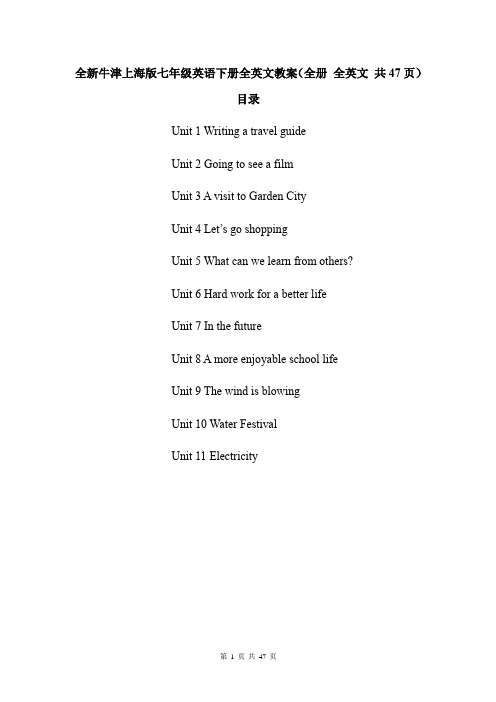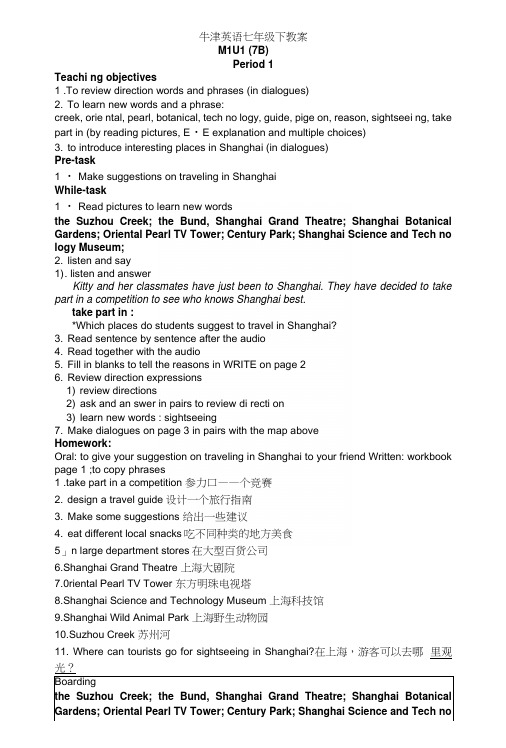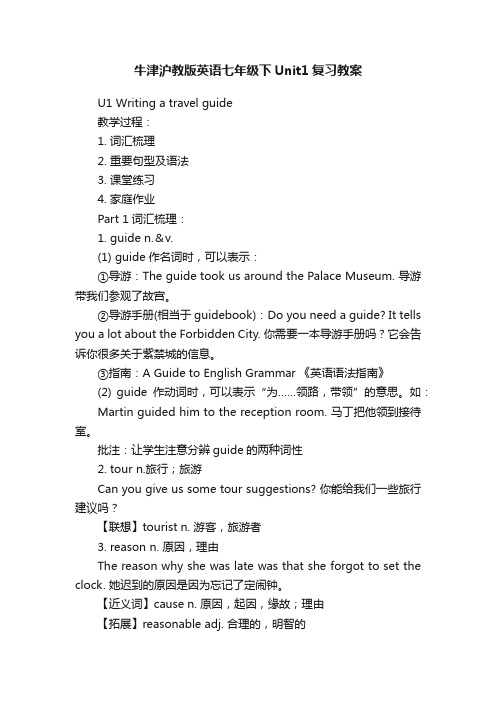沪教牛津版 七年级英语下 教案.doc
全新牛津上海版七年级英语下册全英文教案(全册 全英文 共47页)

全新牛津上海版七年级英语下册全英文教案(全册全英文共47页)目录Unit 1 Writing a travel guideUnit 2 Going to see a filmUnit 3 A visit to Garden CityUnit 4 Let’s go shoppingUnit 5 What can we learn from others?Unit 6 Hard work for a better lifeUnit 7 In the futureUnit 8 A more enjoyable school lifeUnit 9 The wind is blowingUnit 10 Water FestivalUnit 11 ElectricityUnit 1 Writing a travel guide1教学目标By the end of the lesson, the Sts will…be able to further practise describing a place and know more about Shanghai.be able to develop their speaking ability of fluency by describing a scenic spot.2学情分析The learners are the students form Class Twelve, Grade Seven of North Jincai Secondary School. They have been learning English for 7 years, so they are of different levels. Quit e a few students are quite excellent. They do well in both speaking and writing. They are very active in class. But some students are at a lower English level. However, sometime s they can speak a little in class. What they need is a language environment. Therefore, g roup work in class is helpful for them to take an active part in the class.3重点难点This is ‘more practice’ part of Module One. The topic is A One-day Tour Plan. We have talked about some famous places in the previous period, so the students have learned so me expressions. There will be a language environment created for them so as to encourag e more of them to talk about scenic spots and their tour plans.Key phrases and sentence structures are familiar to students. But it will be a little hard fo r them to organize language with much new information. So teacher can take fully advant age of group work. The students may have difficulty in listening to the French in the sec ond part because of the accent. Teachers can give students a second chance to listen.Some students may also have difficulty in pronouncing some words. Teachers can guide them t o use the dictionaries on their Pads.4教学过程第一学时教学目标By the end of the lesson, the S ts will…be able to further practise describing a place and know more about Shanghai.be able to develop their speaking ability of fluency by describing a scenic spot.学时重点This is ‘more practice’ part of Module One. The topic is A One-day Tour Plan. We have talked about some famous places in the previous period, so the students have learned so me expressions. There will be a language environment created for them so as to encourag e more of them to talk about scenic spots and their tour plans.学时难点Key phrases and sentence structures are familiar to students. But it will be a little hard fo r them to organize language with much new information. So teacher can take fully advant age of group work. The students may have difficulty in listening to the French in the sec ond part because of the accent. Teachers can give students a second chance to listen.Some students may also have difficulty in pronouncing some words. Teachers can guide them t o use the dictionaries on their Pads.教学活动活动1【导入】Lead inIt’s said that th ey really enjoyed the trip to Shanghai. Do you want to know where they have been? I will show you some pictures of places they’ve been. Please take notes when you are watching.T gives the following instructions:1. I will show you some pictures of places they’ve been.2. Please take notes when you are watching.3. After that, please tell me how many places are there altogether and what they are.T shows four pictures of some places.S answers according to the picture.T corrects the mistakes and may show the pictures again if necessary.(Pudong International Airport, the bund, Yu garden, Shanghai zoo, Xintiandi, Shanghai Sci ence and Technology Museum and Shanghai Museum)活动2【活动】Input-listeningT: Among these pictures, do you know their favourite place?Students may give some answers or no answer.T: I’ve invited 4 French students to talk about their favourite places. Let’s listen to them. Please take notes while listening.T plays the recording one by one.T invites students to give answers and give reasons.T gives feedback if the students’ answers are wrong.活动3【活动】Input-readingT: French students told me that they wanted to know more about Shanghai, about those t hey have been to, and also about those they haven’t. Would you please give them some i ntroductions about more places? First, you need to read some instructions.T gives the instructions.1. Work in a group of 6.2. Each group needs to read 8 passages and find useful information as much as possible.3. Take notes and finish the table.4. Group A is responsible for sightseeing, Group B shopping and Group C eating.T provides individual drilling.活动4【活动】Output-an introduction about a scenic spotT invites some students to introduce some scenic spots according to the information they have taken down.T gives feedbacks about their presentations.活动5【活动】Output-a tour planT: I think they will enjoy those places. So why not make a tour plan for them? Please d iscuss with your group members and make a one-day tour plan for them. Each group nee ds to focus on your task. (Group A sightseeing Group B eating Group C shopping.)T provides individual drilling.T invites some students to give presentations about their tour plans.T gives feedbacks about their presentations.活动6【作业】AssignmentT: Write down your 3-day tour plan for French students. The school may use your plan next year.e.g.: On the first day, they are going to …Unit 2 Going to see a film1教学目标认知目标:课标词汇hardly, type, operate, railway, fly, judge, raise, instruction, program, mistake, hold, video, more importantly, have great understanding of…, make mistakes, for the time being拓展词汇unaware, be unaware of…, dependent, be dependent on…,diagram,essential, drive, CD-ROM, DVD-ROM2. 能力发展目标:1)通过多种形式的阅读活动与任务,培养一些阅读微技能,如:整体把握文章大意,快速搜索信息的能力2)设计小组合作,学会交流与合作3)情感目标:拓展学生视野,培养学生正确表达自己观点,学会对电影做出评价2学情分析1.这是一篇影评,比较枯燥,学生容易失去兴趣。
深圳沪教牛津版七年级下册英语Unit 1 教学教案

Unit1单词一览person [ 'pə:sn ] n.人cheerful[ 'tʃiəful ]adj. 快乐的;高兴的hard-working[hɑ:d 'wə:kiŋ] adj. 工作努力的;勤勉的patient [ 'peiʃənt ] adj. 耐心的smart[ smɑ:t ] adj. 聪明的;机敏的probably [ 'prɔbəb(ə)li ] adv. 很可能forget [ fə'get ] v. 忘记smell [ smel ]n. 气味care[ keə(r) ]n. 照顾;照料miss[ mis ] v. 想念;怀念joke[ dʒəuk ] n. 玩笑laugh[ la:f ] v. 笑remain [ ri'mein ] v. 仍然是;保持不变strict[ strikt ] adj. 严格的;严厉的encourage [ in'kʌridʒ ] v. 鼓励support[ sə'pɔ:t ]n. 支持successful [sək'sesfl]adj. 获得成功的member [ 'membə(r) ] 成员paragraph [ 'pærəgra:f ] 段落词汇精讲1.________人__________ adj.个人的personal computer________ 【即学即用】:( ) He is an honest _______ , so what he said is believable.A. childrenB. smellC. jokeD. person2.快乐的高兴的(adj) _____________ = ______________ 【同根词】_______ n & v高兴;使振奋【固定搭配】:cheer up________ *cheerleader___________Cheerleaders’ task(任务) is to cheer up players._________________________________________________ _____●Yellow is a _________________ (cheer) color.●She is a happy girl. She is always __________________(cheerful / sad).【即学即用】:()1. --- He has many friends, so he always looks cheerful.--- Yes, he really is.A. sadB. worriedC. happy()2. Tom is a _______ student. So he does well in his lessons.A. cheerfulB. tallC. hard-workingD. lazy3. (1) __________ adj. 耐心的_______ n. 耐心【固定搭配】:be patient with sb _______________________(2) ________ n.病人The doctor is patient with his patients.Mr Oliver is very_____________ (patience).5. _____ adj.聪明的= ___________比较级: ______________ 最高级______________●At present, everyone is playing smart phone on thesubway.●He likes to ask himself “Am I smarter? ”6.___________ adv.很可能= ___________【同根词】:adj. _________You’re ____________ (probable) right.—“Will it be a sunny day tomorrow?”—“Probably not.”7.________ v.忘记(过去式)________(过去分词)___________【反义词】:___________forget的短语:forget to-v / forget v-ing(1) forget to do sth.表示“______________”(未做)Don’t forget to turn off (关闭)the light when you leave.(2) forget doing sth表示“_______________”(已做)He forgot watering (浇花) the flowers.思考:remember to v 与remember v-ing●remember to do sth.表示________________________________________●remember doing sth.表示_________________________________________【即学即用】:●( )Don’t forget an umbrella you.It’s going to rain.A. to take; toB. taking; toC. to take; withD. take; with●I forgot _______ (close) the door, so I went back to have alook.●Remember ______ home to see your grandparents usually.8.____________ n.气味;v.闻;闻起来①作名词,意为“气味”。
牛津上海版七年级英语下册教学设计:Unit7Inthefuture

(二)讲授新知
1.教学活动设计:
-采用讲解、示例、互动问答等形式,帮助学生掌握一般将来时态的用法。
-结合图片和实际情境,引导学生学习本单元的词汇和短语。
2.教学内容:
-讲解一般将来时态的结构,如will、be going to,并通过例句展示其用法。
2.难点:如何引导学生运用一般将来时态进行准确、流畅的口语表达和书面表达;培养学生对未来话题的深入思考和创造性想象。
(二)教学设想
1.创设情境,激发兴趣:通过展示未来科技发展的图片和视频,引发学生对未来世界的思考,激发学习兴趣,为新课的学习做好铺垫。
-利用多媒体资源,呈现太空探索、环保技一)导入新课
1.教学活动设计:
-利用多媒体播放一段关于未来科技发展的短片,引发学生对未来世界的好奇心和兴趣。
-短片结束后,邀请学生分享他们对未来科技的看法和期待,为新课的学习营造积极氛围。
2.教学内容:
-通过提问方式,引导学生回顾已学过的时态知识,为新学习的一般将来时态做好铺垫。
3.任务型教学,促进交流:设计丰富多样的课堂活动,鼓励学生运用目标语言进行互动交流,提高语言实际运用能力。
-小组合作,编写关于未来生活的对话或短文,培养学生的合作精神和口语表达能力。
-角色扮演,模拟未来场景,让学生在实际情境中运用所学知识,提高语言运用能力。
4.拓展思维,培养创造能力:引导学生关注未来科技、环保等社会问题,激发他们的思考和创新意识。
-编写一段关于未来生活的短文,至少包含5个本单元所学词汇,要求语言表达准确、流畅。
2.口语作业:
-与同学合作,进行一次关于未来科技或环保话题的角色扮演对话,记录下来,并尝试使用一般将来时态进行表达。
牛津沪教版英语七年级下Unit1 新课教案

We’ll go on an outing if it doesn’t rain tomorrow.
If you go there, you can find a famous church.
24.世纪公园Century Park
25.上海科技馆Shanghai Science and Technology Museum
26.卢浦大桥Lupu Bridge
27.外滩the Bund
28.在崇明岛上on Chongming Island
29.以……闻名be famous for
30.被誉为be known as
5.看喷泉和鸽子see fountains and pigeons
6.吃不同的地方小吃eat different local snacks
7.去南京路go to Nanjing Road
8.在大型百货公司购物buy things in large department stores
9.去过某地(已返回)have been to …
It is + adj. + to do sth.表示“做……太……了”
It is convenient to travel between Pudong and Puxi.
=To travel between Pudong and Puxi is convenient.
It is terrible to have dinner in this restaurant. The food tastes awful.
41.做某事是很方便的It is convenient to do….
上海牛津英语七下教案.docx

牛津英语七年级下教案M1U1 (7B)Period 1Teachi ng objectives1 .To review direction words and phrases (in dialogues)2. To learn new words and a phrase:creek, orie ntal, pearl, botanical, tech no logy, guide, pige on, reason, sightseei ng, take part in (by reading pictures, E・E explanation and multiple choices)3. to introduce interesting places in Shanghai (in dialogues)Pre-task1 ・ Make suggestions on traveling in ShanghaiWhile-task1 ・ Read pictures to learn new wordsthe Suzhou Creek; the Bund, Shanghai Grand Theatre; Shanghai Botanical Gardens; Oriental Pearl TV Tower; Century Park; Shanghai Science and Tech no logy Museum;2. listen and say1) . listen and answerKitty and her classmates have just been to Shanghai. They have decided to take part in a competition to see who knows Shanghai best.take part in :*Which places do students suggest to travel in Shanghai?3. Read sentence by sentence after the audio4. Read together with the audio5. Fill in blanks to tell the reasons in WRITE on page 26. Review direction expressions1) review directions2) ask and an swer in pairs to review di recti on3) learn new words : sightseeing7. Make dialogues on page 3 in pairs with the map aboveHomework:Oral: to give your suggestion on traveling in Shanghai to your friend Written: workbook page 1 ;to copy phrases1 .take part in a competition 参力口——个竞赛2. design a travel guide设计一个旅行指南3. Make some suggestions 给出一些建议4. eat different local snacks吃不同种类的地方美食5」n large department stores在大型百货公司6.Shanghai Grand Theatre 上海大剧院7.0riental Pearl TV Tower 东方明珠电视塔8.Shanghai Science and Technology Museum 上海科技馆9.Shanghai Wild Animal Park 上海野生动物园10.Suzhou Creek 苏州河11. Where can tourists go for sightseeing in Shanghai?在上海,游客可以去哪里观光?Boardingthe Suzhou Creek; the Bund, Shanghai Grand Theatre; Shanghai Botanical Gardens; Oriental Pearl TV Tower; Century Park; Shanghai Science and Tech nology Museum;M1U1 (7B)Period 2Teachi ng objectives1 .To review di recti o n words and phrases (in dialogues)2. To learn new words and a phrase:creek, oriental, pearl, bota nical, tech no logy, guide, pige on, reas on, sightseei ng, take part in (by reading pictures, E・E explanation and multiple choices)3. to introduce interesting places in Shanghai (in dialogues)Pre-task1. listen and reviewWhile-taskI ・ Learn new phrases in situation and consolidate by making examplesbe famous for; be known as2. learn new words and phrases by reading picturesnight view; shopping paradise; district; Maglev; state; resort; observatory 3. learn new words in E-E explanationget on well with4. read silently and answer questions for the first paragraph;5. answer questions to complete the second paragraph;6. read paragraph 3 silently and do True or False; retell according True or False7. read paragraph 4 silently and answer questions; explainHomeworkOral: recite paragraph 1 +2/3/4; read the leftWritten: workbook page 4,5; copy words and phrases: 词汇:1. therefore 因此adv.词组:2. an observatory 一个天文台3. get on with 进展4. be famous for night views 以夜景而著名5. be known as被认为…;誉为…6. a shopping paradise 购物天堂7. one of the largest cities 最大的城市之一8. a huge open area with green grass——片巨大的开放的绿土也9. Pudong New District 浦东新区10. go there for sightseeing and fun 去那里观光游乐句子:II ・ How are you getting on with your travel guide?你们的旅行指南进展怎样T?12. Ifs convenient to travel between Pudong and Puxi.在浦东和浦西之间通行很方便。
牛津沪教版英语七年级下Unit1复习教案

牛津沪教版英语七年级下Unit1复习教案U1 Writing a travel guide教学过程:1. 词汇梳理2. 重要句型及语法3. 课堂练习4. 家庭作业Part 1词汇梳理:1. guide n.&v.(1) guide作名词时,可以表示:①导游:The guide took us around the Palace Museum. 导游带我们参观了故宫。
②导游手册(相当于guidebook):Do you need a guide? It tells you a lot about the Forbidden City. 你需要一本导游手册吗?它会告诉你很多关于紫禁城的信息。
③指南:A Guide to English Grammar 《英语语法指南》(2) guide作动词时,可以表示“为……领路,带领”的意思。
如:Martin guided him to the reception room. 马丁把他领到接待室。
批注:让学生注意分辨guide的两种词性2. tour n.旅行;旅游Can you give us some tour suggestions? 你能给我们一些旅行建议吗?【联想】tourist n. 游客,旅游者3. reason n. 原因,理由The reason why she was late was that she forgot to set the clock. 她迟到的原因是因为忘记了定闹钟。
【近义词】cause n. 原因,起因,缘故;理由【拓展】reasonable adj. 合理的,明智的批注:the reason why的句可以让学生用在写作中。
3. take part in 参加(活动)如:We’ll take part in the sports meeting this Friday. 本周五我们要参加运动会。
They have decided to take part in a competition. 他们决定参加一个竞赛。
word完整版牛津沪教版英语七年级下Unit1复习教案
牛津沪教版英语七年级下Unit1 复习教案U1 Writing a travel guide教学过程:1.词汇梳2.重要句型及语3.课堂练4.家庭作Part 词汇梳理1. guid nv.(1) guid作名词时,可以表示①导游The guide took us around the Palace Museum.导游带我们参观了故宫②导游手相当guidebookDo you need a guide?It tells you a lot about the Forbidden City.你需要一本导游手吗?它会告诉你很多关于紫禁城的信息③指南A Guide to English Grammar《英语语法指南(2) guid作动词时,可以表…领路,带的意思。
如Martin guided him to the reception room.马丁把他领到接待室批注:让学生注意分guid的两种词2. tour n旅行;旅Can you give us some tour suggestions?你能给我们一些旅行建议吗【联想touristn.游客,旅游3. reason n.原因,理The reason why she was late was that she forgot to set the clock.她迟到的原因是因为忘记了定闹钟【近义词causen.原因,起因,缘故;理【拓展reasonableadj.合理的,明智批注the reason wh的句可以让学生用在写作中3. take part in参加(活动如We'll take part in the sports meeting this Friday.本周五我们要参加运动会They have decided to take part in a competition.他们决定参加一个竞赛【比较take part ijoin都参的意思take part in表示参加某项活动joi示参加或加入某个团体或组织如He joined the Party ten years ago他十年前入党I'll join the Youth League next month.下个月我要入团【提示take part in = join in批注:注take part injoi的区4. sightseeingn观光;游Tourists usually go there for sightseeing and fun游客们通常会去那儿观光游玩【记忆go sightseein去观【联想go shoppin去购物go swimmin去游泳go fishin去钓鱼go travellin去旅游11/ 1复习教案牛津沪教版英语七年级下Unit1去徒步旅行go boating去划船;go hiking go camping去野营;go cycling去骑车;去打猎go windsurfing去风帆冲浪;go hunting go skating去溜冰;观光旅游 a sightseeing tour【拓展】a sightseeing bus观光旅游车的中部位于……5. in the centre ofin the middle of 强调与四周距离相等的中心位置,常用来指空间;【比较】in the centre of强调两端之间的位置,并不强调中心,既可用于指空间,也可用于指时间。
牛津沪教版英语七年级下Unit2 新课教案
15. get to…from…从…到…
16. the way to the cinema到电影院的路
17. turn left/ right…into_______(street/road)向左/右拐进…路/街道
【语言点精讲】
1.I like funny films very much.
牛津沪教版英语七年级下unit2新课教案16七年级下unit一新课讲解词汇拓展do同义词组wouldlikedo想要做某事filmguide阅读电影指南discusswhichfilmsee讨论看哪部电影看一看havefumyfilms滑稽电影actionfilm动作片filmsaboutadventuresclownspolicemenrobbers冒险片小丑片警匪片robber抢劫犯要注意robrobberylovestoryabout?一个关于?的爱情故事fullfun充满笑声和趣事laughv
( ) 8. We’ve got to decide which film _________.
A. has seen B. to see C. seeing D. see
( ) 9. There are quite _________ interesting films on these days.
full of laughter and fun充满笑声和趣事
laugh笑(v.)laughter笑声(n.)
be full of充满full是个形容词,表示满的,饱的
be full of与be filled with是近义词,同时要注意
fill……with……的用法(用。。。装满。。。)
e.g. The room is full of people.这间屋里挤满了人----The room is filled with people.
Unit4第二课时教案-2023-2024学年牛津上海版英语七年级下册
- 自主学习法:引导学生自主思考,培养自主学习能力。
- 信息技术手段:利用在线平台、微信群等,实现预习资源的共享和监控。
- 作用与目的:帮助学生提前了解一般过去时态的用法,为课堂学习做好准备。培养学生的自主学习能力和独立思考能力。
2. 课中强化技能
教师活动:
- 导入新课:通过讲述一个有趣的故事,引出一般过去时态的用法,激发学生的学习兴趣。
核心素养目标分析
本节课旨在培养学生的英语学科核心素养,包括语言能力、文化意识、思维品质和学习能力。
1. 语言能力:通过阅读和讨论,学生能够运用一般过去时态描述过去的事件,提高他们的口语表达能力和写作能力。
2. 文化意识:通过学习故事中Inventor的创新精神,学生能够了解和尊重不同的文化背景,培养跨文化交际的能力。
在教学过程中,我将引导学生通过阅读理解故事内容,学习一般过去时态的构成和用法。通过小组讨论和互动,学生能够运用一般过去时态描述过去发生的事情。在课堂活动中,我将鼓励学生积极参与,提高他们的口语表达能力和团队合作能力。
在教学资源方面,我将使用多媒体教具如PPT和视频,以增加学生对课程的兴趣和参与度。同时,我会设计一些互动游戏和练习,使课堂氛围更加活跃,帮助学生更好地理解和运用所学知识。
3. 随堂测试:设计一份随堂测试,包括选择题、填空题和简答题,以评估学生对一般过去时态的掌握程度。测试内容应涵盖时态的构成、用法和实际运用。
4. 作业完成情况:评估学生完成作业的质量和速度。检查学生是否能正确运用一般过去时态,并在作业中展示出对故事内容的理解。
5. 学生自我评价与反思:要求学生对自己的学习过程和成果进行自我评价和反思。评估学生是否能识别自己的不足,并提出改进建议,以促进自我提升。
牛津版上海版七年级下册 unit 7 in the future优秀教案(重点资料).doc
Unit 7 In the future1教学目标A. Knowledge objective:To help students grasp the meanings of the new words and phrase sin the text and understand the text.B petence objective:To develop thents’ ability to use English to express their idea s about futureC. Emotional objective:To help students know that their future will be made by themsel ves.2学情分析学生在前面几个单元的学习中,已ere be 句型的基本用法,因此在学习Perhaps there will be…的句型时不会感到太困难;但是对于未来的生活,每个学生都有各自的想法,因此在运用I think so.和 I don’t th ink so.时能较好地发挥各自的想象力,让未来生活的概念和自己的生活联系起来,并且有所憧憬3重点难点Teaching important points:To master some new words and phrases: talkabout, be able to, planet, space station, pill ,meal,take pills for mealsTo learn the sentence pattern:What do you think will happen in the future?Perhaps people will (not) be able to … / Perhapsthere will (not) be…/I think so./ I don’t think so. Teaching difficult points:Understand the nd learn to communicate with others in proper En glish expressions.4教学过程第一学时教学活动活动1【导入】Pre-task preparationAsk the students to listen to a song A Bright Tomorrow in My He art.Talk abe song and ask students if they think so to lead in the new lesson.A. People will have robots in space stations.B. People won’t take pills for meals.C. There will be books only on computer,not on paper.D. There will not be enough food for everybody.E. People will be able to live on other planets.教师通过播放歌曲使课堂气氛活跃起来,课堂教学活动能顺利进行,课堂气氛也会变得生动活泼,和谐轻松.活动2【活动】While-task procedure教师活动Ask the stude listen to the text and answer the question: What do they think will happen in the future?预设学生行为Listen to the text on page 44 and follow the tapeLook at theres and complete the sentences about life in the fut ure.Talk about fe in the future with the pictures given. Practice t he followingdialogue:Listen to an interview about life in the future onthe moon and tell whether the statements are True or False设计意图整个这个环节是本堂课的重要环节,通过对课文的听、说、读以及判断正误的进行,学生对课文的重点知识有了循序渐进的熟悉和理解。
- 1、下载文档前请自行甄别文档内容的完整性,平台不提供额外的编辑、内容补充、找答案等附加服务。
- 2、"仅部分预览"的文档,不可在线预览部分如存在完整性等问题,可反馈申请退款(可完整预览的文档不适用该条件!)。
- 3、如文档侵犯您的权益,请联系客服反馈,我们会尽快为您处理(人工客服工作时间:9:00-18:30)。
Step2Read and learn
1.Why is Hong Kong a great place for shopping?
2.What can visitors see in the Lowland Gardens?
3.How can visitors get a bird’s-eye view of thewhole park?
4.What can visitors watch at the Ocean Theatre?
Step3Complete the le.
Hong Kong is a “Shopping Paradise(天堂)” . You can get whatever you want in Hong Kong’s shops, and not everything is __________ . Some things are very cheap. There are many _________________ in Hong Kong. One of the most famous places is ___________. There you can see many animals and watch a special ______________. Getting a __________________ of the whole park by _____________ is also enjoyable. Other interesting things and places in Hong Kong are waiting for you. Why not come soon and have a ____________ time?
Step4Discussion
S1:What can I do in Hong Kong?
S2:If …, you will/can …
板书设计:
总结反思:
Key point:通过阅读初步了解香港的旅游资源。
Difficult point:采集阅读文本的相关信息并归纳、重新组织语言,正确回答问题。
Step1Lead-in
1.WhereisLo’s head made in?
2.Do you want to visit HongKong?Why?
3.Is it one of the largest cities in the world?
辛安泉中学七年级英语(教)学案
编写人:崔沙沙年月日
课题
Unit6 More practice
课时
Period 4
组别
姓名
Teaching aims:
1.通过拓展阅读,识记更多口头和书面表达的语言素材。
2.根据补充阅读文本的信息,回答相关问题。
3.了解香港特色的文化是祖国文化的重要组成部分,培养学生的爱国情操。
